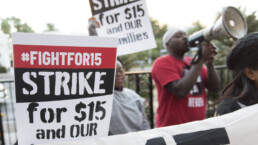Ten years in, the movement to raise the minimum wage is gaining momentum across the country.
by Sharon Johnson, The Progressive
Kimberly Baker did everything right. She was at the top of her high school class and began working at the age of seventeen in a grocery store in Lincoln, Nebraska. She completed a degree in foreign languages while working full time in the insurance industry. But despite her skills and perseverance, the thirty-eight-year-old single mother earns only $13.26 an hour, too little to rent a modest apartment.
“I get by because my sixteen-year-old son and I live with my parents, retired nurses who own their home,” Baker says. “Although I supplement my earnings in the insurance industry by working as a tutor of Latin and a translator of French, it is impossible for me to take vacations or to save for my son’s college education or a master’s degree that would enable me to land a job in a better-paying industry.”

Baker’s experience is common, says Ben Zipperer, an economist at the Economic Policy Institute (EPI), a think tank that studies the impact of economic trends on workers.
“Unfortunately, low wages are widespread throughout the labor market,” he tells The Progressive. “It is not just a problem of a teenager working after school to earn spending money, but an enormous burden for adults working two or three jobs for substandard wages that barely keep food on the table.”
Recent Posts
What To Do When You See ICE In Your Neighborhood
July 14, 2025
Take Action Now How can you deter the Trump administration’s immigrant deportation machine when it pops up in your community? Follow these…
ICE Campaign Of Violence Will Lead To More Deaths
July 14, 2025
Take Action Now Jaime Alanis’s death shows the horrific consequences of a secret police force behaving with utter impunity.By Natasha Lennard, The…
Hague Group: “Concrete Measures” or Sack of Cement? Will It Move to Sanctions, Peace Force and Ensuring Aid to Gaza?
July 13, 2025
Take Action Now Will the meeting in Colombia be a coalescence of global opinion driving states to just action — or just more rhetoric from various…
Why Are Democratic Lawmakers Still Meeting With Netanyahu?
July 12, 2025
Take Action Now Pictures show Democrats like Chuck Schumer standing next to Netanyahu, smiling.By Sharon Zhang, Truthout A bipartisan group of…




